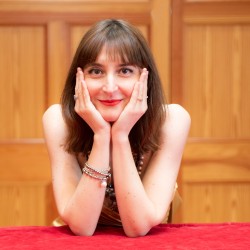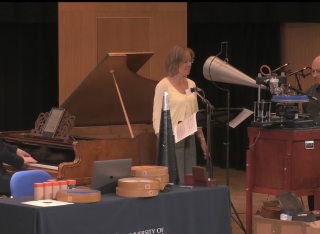
Dr Barbara Gentili
About
Biography
I graduated in Law at the University of Perugia and in Opera Singing at the Milan Conservatoire. I gained my PhD in Musicology at the Royal College of Music in London in 2019.
I am an opera historian and singer who combines embodied methodologies with critical-historiographical perspectives. Through this approach, I explore the relation between voice - intended as a cultural, mediated and performative phenomenon - and constructs of gender, race, class and identity.
I sang leading roles in major Italian opera houses and have been awarded a Leverhulme Early Career Fellowship (2020-2023) and short-term Fellowships from the Beinecke Library at Yale University (2022) and the British School at Rome (2020).
I am an active concert singer and have written about opera and singers for the Spectator, Opera Magazine, OperaClick and Il giornale della musica.
ResearchResearch interests
My research interests encompass the cultural and transnational history of opera and operatic singers from the nineteenth century to our day; women's history; the cultural, technological, mediated and commercial impacts of early recordings; and music autoethnography.
My first monograph, Italian Opera Singing at the Time of Verismo. The Invention of the Modern Voice (Boydell and Brewer, 2024) investigates the creation of a new modern voice in the decades that span the turn of the twentieth century. The book identifies and explores the formative elements of this multifaceted ‘modernity’, and its connections with the emergence of verismo, a realistic trend that affected every aspect of creative and intellectual life in fin-de-siècle Italy. This novel approach to artistic representation meant that singers had to redefine the operatic voice, exchanging the bel canto ideal of ‘pure’ vocal quality with an irreversible gendered connotation and an erotically charged expressive force. Star singers such as Enrico Caruso, Titta Ruffo and Emma Carelli were instrumental in this radical transition which ultimately reshaped operatic culture. The book has been awarded an AMS 75 PAYS Fund from the American Musicological Society.
I am currently working on a second monograph, Performing the Donna Nova: Femininity On and Off the Stage, which is based on my Leverhulme project and is under contract with Oxford University Press. I look at the contribution of Italian female stage artists to the transformation of female identity in the early twentieth century. Starting in Italy, the monograph takes a transnational and global trajectory as it follows the continuous journeys of my main case studies, sopranos Eugenia Burzio and Emma Carrelli, who I frame within a solid network of female influence. Through multiple media including theatre, opera, photography, magazines and dailies, early recordings and other forms of advertisement stage women disseminated a kaleidoscopic imagery of femininity which exchanged a well-entrenched, one-dimensional idea of womanhood with one enlivened by individuality and self-knowledge. In their exceptionalism, these women consciously embraced a path of personal self-discovery which is revealed through individual reflection in both private correspondence and public documents.
Together with Paulo Mugayar Kühl and Clair Rowden, I am editing Opera in Transnational Contexts: Circulating Identities and Cultures (Routledge, 2026), which offers a global narrative for opera across two centuries (from the late 1700 to late 1900) and reveals how complex constructions of identity and cultural value have been forged through the circulation, production, translation, adaptation and reception of different operatic and non-operatic genres.
I have published major articles for the Journal of the Royal Musical Association (JRMA), Cambridge Opera Journal, and Music and Letters, and contributed chapters on recorded music for three Routledge edited volumes.
I have organised and co-organised conferences, symposia and workshops among which most recently:
- The Theatrical Voice https://www.surrey.ac.uk/events/20240523-theatrical-voice-performing-class-gender-race-and-identity
- Opera in Transnational Context (with Clair Rowden) at Cardiff University
- Caruso at 100 in collaboration with WNO
- Early Recordings: the Impacts of a Transformative Technology at the RCM
- Interconnections: a Festival of Arts and Humanities at Newcastle University
Research interests
My research interests encompass the cultural and transnational history of opera and operatic singers from the nineteenth century to our day; women's history; the cultural, technological, mediated and commercial impacts of early recordings; and music autoethnography.
My first monograph, Italian Opera Singing at the Time of Verismo. The Invention of the Modern Voice (Boydell and Brewer, 2024) investigates the creation of a new modern voice in the decades that span the turn of the twentieth century. The book identifies and explores the formative elements of this multifaceted ‘modernity’, and its connections with the emergence of verismo, a realistic trend that affected every aspect of creative and intellectual life in fin-de-siècle Italy. This novel approach to artistic representation meant that singers had to redefine the operatic voice, exchanging the bel canto ideal of ‘pure’ vocal quality with an irreversible gendered connotation and an erotically charged expressive force. Star singers such as Enrico Caruso, Titta Ruffo and Emma Carelli were instrumental in this radical transition which ultimately reshaped operatic culture. The book has been awarded an AMS 75 PAYS Fund from the American Musicological Society.
I am currently working on a second monograph, Performing the Donna Nova: Femininity On and Off the Stage, which is based on my Leverhulme project and is under contract with Oxford University Press. I look at the contribution of Italian female stage artists to the transformation of female identity in the early twentieth century. Starting in Italy, the monograph takes a transnational and global trajectory as it follows the continuous journeys of my main case studies, sopranos Eugenia Burzio and Emma Carrelli, who I frame within a solid network of female influence. Through multiple media including theatre, opera, photography, magazines and dailies, early recordings and other forms of advertisement stage women disseminated a kaleidoscopic imagery of femininity which exchanged a well-entrenched, one-dimensional idea of womanhood with one enlivened by individuality and self-knowledge. In their exceptionalism, these women consciously embraced a path of personal self-discovery which is revealed through individual reflection in both private correspondence and public documents.
Together with Paulo Mugayar Kühl and Clair Rowden, I am editing Opera in Transnational Contexts: Circulating Identities and Cultures (Routledge, 2026), which offers a global narrative for opera across two centuries (from the late 1700 to late 1900) and reveals how complex constructions of identity and cultural value have been forged through the circulation, production, translation, adaptation and reception of different operatic and non-operatic genres.
I have published major articles for the Journal of the Royal Musical Association (JRMA), Cambridge Opera Journal, and Music and Letters, and contributed chapters on recorded music for three Routledge edited volumes.
I have organised and co-organised conferences, symposia and workshops among which most recently:
- The Theatrical Voice https://www.surrey.ac.uk/events/20240523-theatrical-voice-performing-class-gender-race-and-identity
- Opera in Transnational Context (with Clair Rowden) at Cardiff University
- Caruso at 100 in collaboration with WNO
- Early Recordings: the Impacts of a Transformative Technology at the RCM
- Interconnections: a Festival of Arts and Humanities at Newcastle University
Teaching
I have taught undergraduate and postgraduate courses on a variety of subjects including:
- History of Opera,
- Nineteenth-century Italian Opera;
- Transnational Histories of Opera;
- Women in Nineteenth-Century Music;
- Music and Politics;
- MA Research Skills;
- Cultures of Performance;
- Ensemble;
- Performance
Publications
Highlights
Barbara Gentili. Italian Opera Singing at the Time of Verismo. The Invention of the Modern Voice. Boydell and Brewer, 2024.
Barbara Gentili (2024) 'A Project of Her Own: Emma Carelli's Enactment of Femininity in Early Twentieth-Century Italy' Cambridge Opera Journal, Open Access, DOI: https://doi.org/10.1017/S0954586723000228
Vocal Virtuosity offers an intriguing and thought-provoking narrative about the nineteenth-century evolution of a specialized voice type: the coloratura soprano. Singing with ‘nonchalance’ demanding melismatic passages at stratospheric heights, while being supremely expressive, was the achievement of some extraordinary prima donnas in mid- to late nineteenth-century France. They gave coloratura many new, then-modern qualities connected to an exuberant female sexuality, the dancing body, technological advancements of the Second Empire, super-human control akin to instrumental virtuosity, ‘real’ and staged madness, and mechanistic perfection. Parr starts off by closely questioning a well-worn trope in the history of singing—the shift away from mid-nineteenth-century melismatic, agile singing to a more sustained, loud vocalism. Weaving together a wealth of historical sources, detailed musical and textual analyses, and his own experience as a singer, Sean Parr demonstrates not only the continuing presence of florid singing, or ‘coloratura’ during the century, but also its increasingly specialized relevance to its contemporary audiences. By becoming ‘feminine’, coloratura empowered women, becoming inextricably linked to issues of female authorship, cultural advocacy, agency, and representation. The book thus contributes in important ways to both a performance-centred historical musicology and feminist musicology, reclaiming a space for coloratura sopranos in the history of opera.
The idea that classical singers should join the notes of the vocal line by maintaining a consistent vocal colour is a relatively recent historical construct. In the last decades of the nineteenth century, singers in the Italian tradition were loyal to a very different vocal aesthetic, which valued the distinct differences in timbre between different vocal registers, as this article shows through a comparative analysis of pedagogical writing and pre-1925 recordings. The latter reveal that, in the early twentieth century, old and new techniques for uniting the vocal registers coexisted, and reflected an aesthetic transition towards a more gendered quality of the operatic voice. This process was intertwined with profound transformations in Italian operatic culture. The demands of a new realistic idiom known as verismo required a new type of vocalism, which prompted singers to re-conceive the ‘art of vocal registration’.
In the decades spanning the turn of the twentieth century Italian opera singing underwent a profound transformation and became ‘modern’. I explore the formative elements of this modernity and its long-term effects on the way we sing today through the paradigmatic case of the tenor Enrico Caruso. I frame Caruso’s vocal evolution within the rise of verismo opera, comparing selected recordings, reviews and the rules and aesthetic prescriptions contained in vocal treatises to show how his new vocalism differed from that of the old bel canto. To set Caruso’s achievement in context I also analyse recordings of two other tenors of the era: Giovanni Zenatello and Alessandro Bonci.
Early recordings from the pre-electrical era have something magical and unique about them: they preserve the fresh impression of live performances, unmediated by the adjustments of technology. The singers’ lack of any previous experience in what recording a disc of a cylinder consisted of explains why they failed to appreciate the profound differences between singing on stage and singing in front of a phonograph.
Emma Calvé could not be convinced that stamping her feet while recording Carmen’s Seguedilla was pointless for the listener, who was unable to see her acting. The negotiations which often preceded great singers’ involvement with the recording industry were exhausting, such as in the case of Nellie Melba. In particular, Melba’s reluctance to release her recorded material, and her skepticism regarding the ability of the early reproduction process to capture the quality of her voice, show how traumatic the advent of recording was for some interpreters of those days.
From the exclusive perspective of the Italian operatic tradition, I will focus on the reactions of singers and audiences to the advent of recorded sound, and its revolutionary impact on the personal experience of listening to music.
